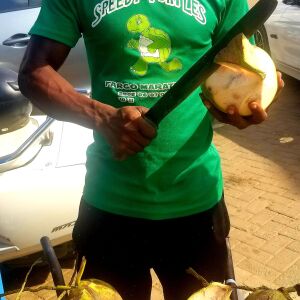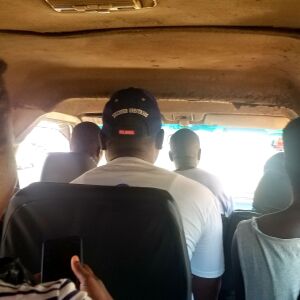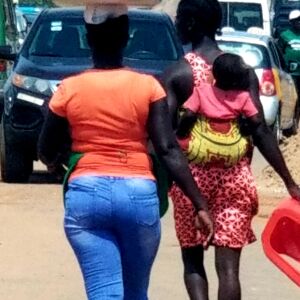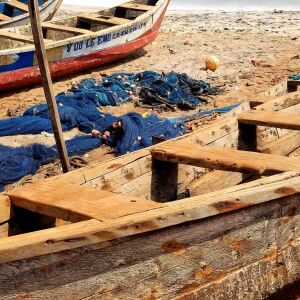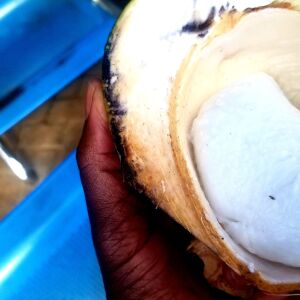ACCRA, Ghana — My heart has crossed this ocean but there is no Vibranium here. No mythical supernatural people of coal to caramel skin.
I find here no sign of the fictional Hollywood African nation of Wakanda that spoke to that longing in the hearts of African Americans in the movie “Black Panther,” with visions of hope and serendipity. No utopia — Ghana. No grandiose illusions — pure Ghana, population 31.98 million.
And yet, there is something here.
Something there is, embodied in the bended emerald branches of coconut trees, that speaks to me. Something about the way the white foam waves crash upon these ancestral shores on this side of the Atlantic Ocean in this Gold Coast nation, where W.E.B. DuBois lies buried. Something that soothes my Black soul, relieves my searing double consciousness like water extinguishing a flame.
There is something about standing here between yesterday and tomorrow — in between the time I can recall of the best in Black America and my current ingestion of the scenes of daily life that pass before my eyes and leave me with deep reflections of how far we’ve come since slavery, and also with plain glaring truths about what we as Black folks inarguably lost somewhere along the journey.
There is something here — vibrant, prideful, dignified, unbroken.
It is apparent, even far beyond the white stone slave castle at Cape Coast, where poverty and the pulse of this capital city converge as one. It moves circumspectly with a sense of purpose and precision that almost defies description.
It glares like the countless glossy, larger-than-life poster images of grinning local preachers peddling hope in neighborhoods across the Greater Accra Region, where signs of struggle glare like the white mannequins adorned in bright-colored African dresses for sale. In communities dotted with shops and houses, some made of tin and wood.
It is clear that life here for many is hard, and a living to be eked out by sweat, ingenuity and enterprise — by the labor of hands and feet in relentless heat, and by one’s willingness to rise up early in the morn.
And yet, they arise. They dot the landscape, their faces filled with resilience and pride that grace the eyes like fine kente cloth — born centuries ago of the Ashanti and Ewe people.
There is something about this place that captivates my heart, soul and mind…
It flows through crowded, sand- and crater-laden, unpaved streets with no curbs, lined with humble shops of locals selling coconuts and watermelons, which they carve with sharp machetes with a surgeon’s precision, or other indigenous fruits, bottled water, juice, wiper blades, just about anything imaginable.
It rises above the morning-to-evening buzz of traffic — of boisterous Tro Tros — the privately-owned, often rickety, open air mini-vans where rambunctious young men beckon for fares and swerve to welcome riders aboard. It rises above the fray of unapologetic taxi and Uber drivers, and the innumerable motorcyclists who zip in between cars, pedestrians and marching merchants who hawk their wares in the roadway market’s hustle and flow to idling motorists and their passengers.
It drifts like the scent of scented mosquito coils drifting on a humid breeze, as I tap my computer keyboard, marshmallow clouds looming overhead in a baby-blue sky.
There is something here that stirs within me generations of tears amid a palpable sense of reconnection to my shackled ancestors who made their journey to the other side long ago in the Middle Passage to American slavery.
Yes, my heart has crossed this ocean. I am a son come home, in some ways, to reconcile my present and future with my past. Aboard a Boeing 787 Dreamliner, not in the hull of a slave ship. By air, rather than by sea. Of my own free will. Not in chains. Driven toward home, rather than taken away. And yet, my heart — like my ancestor’s — yearning to again taste freedom.
Having arrived in Ghana little more than a week ago, I am both a sojourner and intimate observer, listening, tasting, absorbing the culture, from language to splendid Ghanaian jollof rice, plantains and Red Red (a stew) sprinkled with gari, to neighborhoods far beyond the tourist’s fare. And it has become clear to me that even as a Black man in an African nation I stick out as an American — a detectable outsider even among my kinsmen on my ancestors’ native land.
I am greeted warmly by most. But side-eyed by some. I feel friendliness in some places and spaces as I mill about. Tepidness in others. Could it be that I am not welcome in this land either?
“At least,” I think to myself, “this has nothing to do with my race.”
And yet, finding discrimination on this side would cut to the bone.
It is too soon to draw conclusions. But this much I already know: I have been embraced by a community, by brothers and sisters whom I had never seen, but who have welcomed me home as a long-lost son.
My heart has crossed this ocean. And I must continue this journey. But I have already discovered something here much more precious than Vibranium.
#justiceforJelaniDay
John Fountain is a Fulbright Scholar in Ghana. This is his first in a series of dispatches from that country.
Send letters to letters@suntimes.com.










